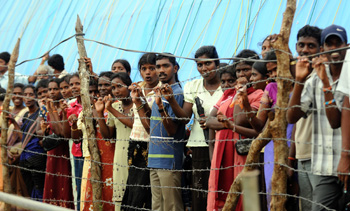Today marks the 100th day of J.S. Tissainayagam’s 20-year prison term. Tissainayagam, known as Tissa, was convicted of “terrorism” charges for articles documenting human rights abuses by the Sri Lankan military, as well as the difficult conditions faced by Sri Lankans displaced in the nation’s long war. His sentence was a dire warning to other journalists who would dare be critical of the government. They are right to be concerned.
In the years since Mahinda Rajapaksa has held high office in Sri Lanka—as prime minister in 2004 and then as president since 2005—nine journalists have been murdered with impunity. According to CPJ data, Sri Lanka has the fourth worst impunity record in the world, behind only Iraq, Sierra Leone, and Somalia. And over the years CPJ and other journalist support groups have been handling a steady flow of requests for assistance while threatened reporters seek either temporary refuge or permanent exile.
Hopes that the government’s anti-media behavior would change once it had successfully ended the bitter war with the separatist Liberation Tigers of Tamil Eelam have yet to be fulfilled. Assaults on journalists who dare to take on the government, not just on the war with the Tamils and its aftermath, but on domestic political and economic issues, have hardly eased as abductions, phone and text threats, and denouncements on official government Web sites continue seven months after the war officially came to an end.
Not many international journalists are singled out by a U.S. president. But this year, on World Press Freedom Day in May, President Barack Obama cited the prosecution of J.S. Tissainayagam as “emblamatic” of press freedom abuses worldwide.
The European Union has continued to bring targeted pressure on the Sri Lankan government: If the government wants to retain preferential trade tariffs, the EU said, it will have to ensure media freedom and release the 300,000 people, almost all of them Tamils, it is holding in camps. The issue is still in the air, but the government has started to shift some of the hundreds of thousands of Tamil war refugees to slightly better conditions. On Wednesday, Robert Blake, U.S. assistant secretary of state for South Asia—and the previous ambassador to Colombo—told reporters that he saw evidence of progress when he visited the site where about 100,000 displaced civilians still live.
International advocacy pressing for Tissainayagam’s release is an important issue, an “emblematic” one as Obama put it. It highlights the broader need for unfettered journalism in one of Asia’s oldest democracies. Sri Lanka’s war against Tamil separatists has ended, but it is too soon for United States and the international community to assume that the government’s war against the media has ended. Victory will only come when Tissa is released and journalists in Sri Lanka know that they are free to write and the country resumes its march toward democracy and out of the tortured ranks of countries like Iraq, Sierra Leone, or Somalia.
